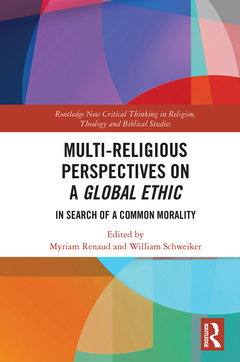Multi-Religious Perspectives on a Global Ethic In Search of a Common Morality Routledge New Critical Thinking in Religion, Theology and Biblical Studies Series
Coordonnateurs : Renaud Myriam, Schweiker William

Ratified by the Parliament of the World?s Religions in 1993 and expanded in 2018, "Towards a Global Ethic (An Initial Declaration)," or the Global Ethic, expresses the minimal set of principles shared by people?religious or not. Though it is a secular document, the Global Ethic emerged after months of collaborative, interreligious dialogue dedicated to identifying a common ethical framework. This volume tests and contests the claim that the Global Ethic?s ethical directives can be found in the world?s religious, spiritual, and cultural traditions.
The book features essays by scholars of religion who grapple with the practical implications of the Global Ethic?s directives when applied to issues like women?s rights, displaced peoples, income and wealth inequality, India?s caste system, and more. The scholars explore their respective religious traditions? ethical response to one or more of these issues and compares them to the ethical response elaborated by the Global Ethic. The traditions included are Hinduism, Engaged Buddhism, Shi?i Islam, Sunni Islam, Confucianism, Protestantism, Catholicism, Judaism, Indigenous African Religions, and Human Rights. To highlight the complexities within traditions, most essays are followed by a brief response by an expert in the same tradition.
Multi-Religious Perspectiveson a Global Ethic is of special interest to advanced students and scholars whose work focuses on the religious traditions listed above, on comparative religion, religious ethics, comparative ethics, and common morality.
Introduction-Myriam Renaud and William Schweiker; Prologue: Ground Rules for Grappling with the Global Ethic-Richard B. Miller; 1 Networking as Equals? Engaged Buddhists’ Egalitarian Ideals and Hierarchical Habits-Hsiao-Lan Hu; 2 Women’s Religious Authority in Shi‘i Tradition: A Quest for Justice-Samaneh Oladi Ghadikolaei; 3 Gu Hongming and the Religion of Good Citizenship: A Confucian Vision beyond Moral Universalism and Relativism-Huaiyu Wang; 4 Avadim Hayinu: An Intersectional Jewish Perspective on the Global Ethic of Solidarity-Amanda Beckenstein Mbuvi; 5 Are There Principles in the Hindu Tradition Consonant with "Freedom, Dignity, and Equality?-Anantanand Rambachan; 6 Globalization, Global Ethics, and the Common Good: Economic Justice and Protestant Prophetic Proclamation-Scott R. Paeth; 7 Sunni Islam and the Estranged Ideal: The Displaced, the Racially Disenfranchised, and the Islamic Prophetic-Martin Nguyen; 8 Decolonizing Religion(s) — A New, Catholic Direction for the Global Ethic-Hille Haker; 9 Tapping the Moral Wisdom of Africa’s Triple Plus Heritage of Religion and Culture-Teresia Hinga; 10 Reflections on the Relationship between Human Rights and Global Ethics-Sumner B. Twiss; Postscript: The Global Ethic’s Fifth Directive to Care for the Earth-Myriam Renaud; Appendix: Towards a Global Ethic: An Initial Declaration
Myriam Renaud is Director and Principal Investigator of the Global Ethic Project at the Parliament of the World’s Religions. She led the Parliament’s effort to expand the Global Ethic with a new directive elaborating a commitment to a culture of sustainability and care for the Earth. academic research focuses on the concept of God, constructive philosophical theology, comparative theology, global ethics, and religion in the public square. She co-edited (with Joshua Daniel) and contributed to the collection of essays, God and the Moral Life (Routledge, 2018), and she is completing a monograph, Toward a Moral God and a Humanizing Theology.
William Schweiker is Edward L. Ryerson Distinguished Service Professor of Theological Ethics at the University of Chicago Divinity School. His scholarship focuses on theological and ethical questions related to global dynamics, comparative religious ethics, history of ethics, and hermeneutical philosophy. The author of several books, his most recent (with David Clairmont) is Religious Ethics: Meaning and Method (Wiley Blackwell, 2020). He is the editor and contributor to the three-volume Encyclopedia of Religious Ethics (forthcoming) and he is currently working on a book entitled Enhancing Life and the Forms of Freedom.
Date de parution : 05-2022
15.6x23.4 cm
Date de parution : 11-2020
15.6x23.4 cm
Thème de Multi-Religious Perspectives on a Global Ethic :
Mots-clés :
Anantanand Rambachan; Multi-Religious Perspectives on a Global Ethic; Human Suffering; Morality; Gu Hongming; Myriam Renaud; Comparative Religious Ethics; Theology; Global Ethic; Interreligious; Eth Ic; Fundamental Moral Attitudes; Parliament of the World’s Religions; Good Life; Religious; Fourth Directives; ethical; Empathetic Openness; beliefs; Achieving Gender Justice; rituals; Muslim Women’s Struggles; legal; Global Ethic Project; women's equality; Global Ethical Framework; immigration; Dynamic Jurisprudence; caste system; Gender Justice; Hinduism; Prophetic Critique; Buddhism; Universal Human Morality; Shi‘I; Sallie King; Islam; Engaged Buddhists; sunni Islam; Concerned African Women Theologians; Confucianism; Dharma Heirs; Protestantism; Advance Gender Justice; Catholicism; Soul Expansion; Judaism; Female Religious Authorities; Indigenous; African; Philosophy of Religion; Cultural tradition; Women's rights; Global Ethic's directives; India's caste system; Displaced peoples



